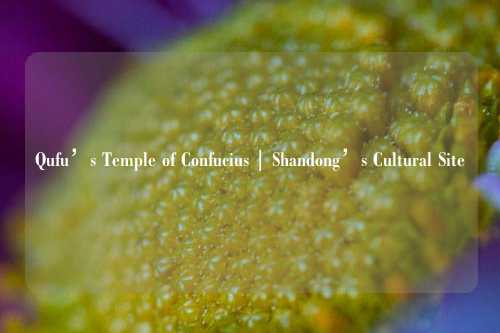Qufu’s Temple of Confucius | Shandong’s Cultural Site
A Historical Landmark in Honor of Confucius
Qufu’s Temple of Confucius stands as one of China’s most historically significant sites, dedicated to the philosopher whose teachings shaped Eastern thought for over two millennia. Located in Shandong Province, this temple is part of a larger complex that includes the Kong Family Mansion and the Cemetery of Confucius. As the birthplace of Confucius, Qufu has become a center of scholarly pilgrimage, drawing visitors eager to explore the roots of Confucianism and its lasting influence on society.
Architectural Grandeur Reflecting Centuries of History
The temple’s architectural design reflects the reverence that generations have held for Confucius. The complex covers an extensive area, with more than 100 buildings arranged in a style reminiscent of the Forbidden City in Beijing. The main structures feature intricate woodwork, imposing stone pillars, and traditional courtyards that create a solemn yet grand atmosphere. Many of these buildings have undergone renovations throughout different dynasties, preserving their historical integrity while showcasing the craftsmanship of various periods.

The Legendary Dacheng Hall
At the heart of the temple lies Dacheng Hall, the most revered structure within the complex. This hall serves as the central place for ceremonies honoring Confucius. The grand interior is decorated with ancient calligraphy, golden inscriptions, and statues that reflect the deep respect for the philosopher’s teachings. The hall’s enormous roof, supported by imposing wooden columns, stands as a testament to the dedication of those who have preserved this site over the centuries.
Stone Inscriptions and Ancient Steles
Scattered throughout the temple grounds are countless steles inscribed with classical texts, imperial decrees, and records of historical restorations. These stone tablets offer insight into the evolution of Confucian thought and the importance placed on education and moral values. Some of the most famous inscriptions date back to the Han and Tang dynasties, making them invaluable historical artifacts. Visitors can walk among these steles, each bearing stories of emperors, scholars, and disciples who contributed to the preservation of Confucius’s legacy.
The Lingxing Gate and Its Symbolism
The entrance to the temple is marked by the grand Lingxing Gate, a structure that embodies the reverence with which Confucius is regarded. This ornate gateway serves as a transition from the outside world into a space dedicated to wisdom and contemplation. The design, featuring traditional Chinese motifs and stone carvings, highlights the significance of education and virtue, key principles in Confucian philosophy.
The Annual Ceremony Honoring Confucius
One of the most anticipated events at the temple is the annual Confucius Memorial Ceremony, held on the philosopher’s birthday in late September. This grand event features ancient rituals, music, and performances that reenact traditional ceremonies conducted by past dynasties. Scholars, officials, and visitors from around the world gather to pay homage to Confucius, keeping his teachings alive through solemn rituals and cultural displays.
The Connection Between the Temple and the Kong Family Mansion
Adjacent to the temple lies the Kong Family Mansion, the former residence of Confucius’s descendants. This mansion offers a glimpse into the daily life of one of China’s most esteemed families. The halls, gardens, and personal study rooms reflect the family’s dedication to scholarship and governance. Visitors can explore the extensive collection of books, furniture, and ancestral tablets that reveal how Confucian values were upheld through generations.
The Tranquility of the Cemetery of Confucius
A short distance from the temple, the Cemetery of Confucius serves as the final resting place of the great philosopher and his descendants. This serene forested area is home to thousands of tombstones, with Confucius’s own tomb standing at the center. The peaceful surroundings, shaded by ancient cypress trees, create a contemplative atmosphere where visitors can reflect on the enduring impact of Confucius’s teachings.
The Influence of Confucianism on Chinese Society
The teachings of Confucius continue to shape Chinese society, and visiting the temple provides a deeper understanding of their significance. Concepts such as filial piety, respect for elders, and the pursuit of knowledge remain fundamental principles in many aspects of life. The temple stands not only as a historical site but also as a living tribute to the ideals that have influenced governance, education, and personal conduct for centuries.
A Destination for Scholars and History Enthusiasts
For those interested in Chinese history, philosophy, and architecture, Qufu’s Temple of Confucius is an essential destination. The combination of grand structures, ancient artifacts, and serene landscapes offers an immersive experience into the legacy of one of China’s greatest thinkers. Whether attending a traditional ceremony, walking through the halls of wisdom, or exploring the surrounding historical sites, visitors leave with a deeper appreciation for the teachings that have shaped generations.
















